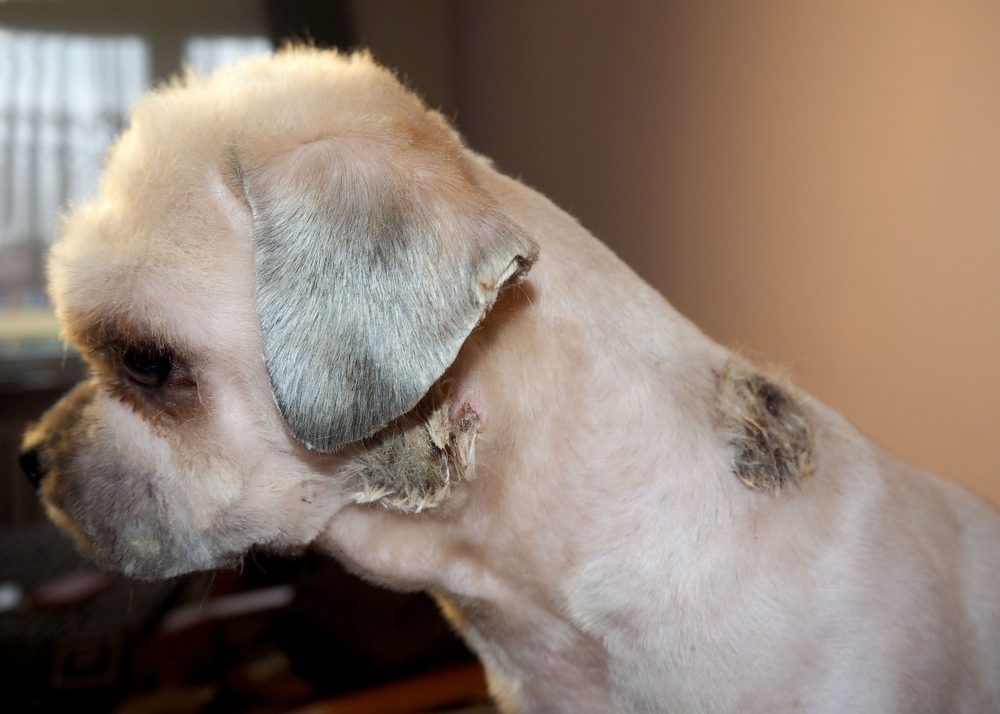Common Allergies in Shih Tzus – Signs, Causes, And Treatments
When you’re a Shih Tzu owner, you must be aware of the common allergies that can affect your pup. Allergies in Shih Tzus can range from minor skin irritations to serious health issues. Knowing the signs, causes, and treatments is essential for ensuring the well-being of your furry friend.
Allergies in Shih Tzus: What Every Owner Needs to Know
Allergies can make anyone feel miserable, and guess what? Our furry friends, like Shih Tzus, can experience them too! Imagine feeling itchy or sneezy and unable to tell anyone what’s wrong. That’s how a Shih Tzu with allergies feels. This section will help you understand what’s going on with your pet and how you can help.
What Are Allergies in Shih Tzus?
Allergies happen when the body thinks something harmless, like pollen or a certain food, is dangerous. It tries to fight it off, which can make your Shih Tzu feel pretty bad. Just like people, Shih Tzus can be allergic to many different things.
Why Are Shih Tzus Prone to Allergies?
Shih Tzus are special little dogs with unique coats and skin, sometimes making them more likely to have allergies. Their cute, squishy faces and loving nature make them great companions, but these traits can also make them sensitive to things in their environment or food.
Different Types of Allergies in Shih Tzus
Let’s talk about the different kinds of allergies your Shih Tzu might face:
- Food Allergies: Some Shih Tzus might get itchy or sick from certain foods. It’s like when someone has a peanut allergy and has to stay away from peanuts.
- Environmental Allergies: These are allergies caused by things around your house or outside, like dust, pollen, or even the shampoo you use on your pet. It can scratch them a lot or sneeze.
- Flea Allergies: Fleas are not just annoying; their bites can make a Shih Tzu’s skin really itchy and irritated. It’s like getting a mosquito bite that won’t stop itching.
Common Triggers and How to Avoid Them
- For food allergies, paying attention to what your Shih Tzu eats and how they react to different foods is crucial. If you notice itching or stomach problems after eating certain things, it might be time to talk to the vet about changing your diet.
- To deal with environmental allergies, keep your home clean and dust-free. Consider using an air purifier to keep the air clean and consider special doggy bedding that resists allergens.
- Regarding flea allergies, regular flea treatment is your best friend. Keeping fleas away from your Shih Tzu can make a big difference in how they feel.
Types of Allergies in Shih Tzus
If you own a Shih Tzu, you must be aware of and prepared for allergies. While not all allergies are the same, understanding the types of allergies your pet may have and what causes them is crucial for managing their health.
1. Food Allergies
Food allergies are among the most common allergies seen in Shih Tzus. These can be caused by any ingredients in their diet, including grains, vegetables, fruits, and proteins. Food allergies often manifest as itchy skin, ear infections, and gastrointestinal issues such as vomiting or diarrhea. To prevent food allergies in your pet, ensure they eat a balanced diet with quality ingredients that don’t contain additives or preservatives. You should also avoid giving them treats made with artificial flavors or colors.
2. Environmental Allergies
Environmental allergies refer to an allergic reaction caused by exposure to pollen, dust mites, mold spores, or other environmental irritants. Symptoms include sneezing, coughing, wheezing, itchy eyes, and skin rashes. To reduce exposure to environmental allergens in your home environment:
-
keep your house clean and free of dust
-
vacuum regularly
-
use air purifiers
-
avoid perfumes
-
use allergen-proof bedding
You should also note when your pet has an allergic reaction, for example, if it occurs after going outside, and try to reduce their exposure to those triggers as much as possible.
3. Flea Allergies
Flea allergy dermatitis (FAD) is an allergic reaction caused by flea saliva when a flea bites a dog’s or cat’s skin. It is one of the most common causes of itching in dogs and cats, including Shih Tzus.
Symptoms include an intense itching that usually starts at the base of the tail but can spread all over the body if left untreated for too long. The best way to prevent FAD is by keeping your pet up-to-date on flea prevention medication prescribed by your veterinarian and ensuring they wear it daily.
You should also check them regularly for signs of fleas or ticks during warmer months when these pests are more likely to be active outdoors.
Signs & Symptoms of Allergies in Shih Tzus
The most common signs and symptoms of allergies in Shih Tzus are:
1. Sneezing
Sneezing is a common symptom of allergies experienced by Shih Tzus. Allergies in this breed can be caused by various stimulants such as grass, pollen, dust mites, and certain fabrics. If your Shih Tzu is experiencing frequent sneezing or nasal congestion, consult a veterinarian to determine the cause.
Depending on the type of allergies, treatments may include a change in diet, proper medication, and administration of topical ointments and sprays. No matter what course of action you choose for your pet, allergies can be managed to help your Shih Tzu lead a comfortable life.
Related: Why Shih Tzu Keeps Sneezing: Causes And Preventions
2. Vomiting or Diarrhea
Allergies in Shih Tzus can be challenging to diagnose due to their small size and naturally low energy levels. One of the common symptoms is vomiting or diarrhea, which can often be mistaken for other health issues or an upset stomach.
However, allergies are a possible cause, particularly if the cooking and diet remain unchanged. Recognizing and treating allergies in Shih Tzus as soon as possible is essential for maintaining optimum health – seek advice from a vet if you think your pup may be suffering from allergies.
3. Itchy skin
Itching and scratching are among the most common signs of allergies in Shih Tzus, which environmental allergies or food sensitivities can cause. If you notice your dog licking, biting, or otherwise irritating their skin more often than usual, it might be a sign that there’s something underlying causing them discomfort.
Don’t wait too long to act; dog allergies are uncomfortable and should be addressed promptly. Visiting the vet to determine the source of allergies can prevent serious medical problems from developing later on.
With the proper care and treatment, your pet and you can eventually find relief.
4. Hot spots
Hot spots are common in dog breeds like Shih Tzus, who often have allergies that may cause their skin inflamed. Hot spots can alert you that they might be experiencing allergies, as they typically appear as red, irritated patches of skin that often feel painful or uncomfortable.
While allergies are one potential cause of hot spots, your dog may be dealing with other issues, such as infection or injury. So it’s always a good idea to take them to the vet and get professional advice if you see any hot spots on their body.
Doing so will help you determine what’s happening and provide the appropriate treatment.
5. Ear infections
Ear infections are a common symptom of allergies in Shih Tzus. The allergies can cause a buildup of wax, dirt, and other debris in the ears, creating an infection. If you notice your pup scratching or shaking its head more than usual, it’s essential to get it to the vet right away for an exam and potential treatment.
Early intervention is critical; the infection can become severe and painful if left untreated. Take care of your furry companion by addressing any allergies as soon as possible so they can be healthy and happy.
6. Runny nose
If you own a Shih Tzu, allergies might be something to watch out for. A runny nose can be one of the tell-tale signs of allergies in these breeds and should always raise suspicion.
The inflammation caused by allergies within the nose can often lead to this symptom. If your pup’s nose becomes runnier than usual, you must take them immediately to the vet for further examination. It can help catch allergies easily before more severe symptoms arise and prevent future discomfort for your furry friend.
7. Watery eyes
Watery eyes are a tell-tale sign that your pup may have allergies. In particular, breeds like the Shih Tzu often develop allergies as they age, which can cause eye inflammation and lead to excess watery discharge.
8. Breathing Difficulties
In severe cases, allergies can make it hard for your Shih Tzu to breathe well. They might cough, wheeze, or seem to have trouble catching their breath. This is less common but very serious.
If you’re worried about allergies in your little four-legged friend, it’s essential to take them to the vet for a check-up so that proper treatment can be administered. Allergies can develop suddenly and worsen quickly, so don’t wait – get your pup checked out.
Diagnosing Allergies in Shih Tzus
When your Shih Tzu shows signs of allergies, figuring out exactly what’s causing the problem is key. Just like detectives, vets have ways to solve this mystery. Here’s how they do it and how you can help your furry friend find relief.
Visiting the Vet
First, if you think your Shih Tzu has allergies, it’s time to see the vet. Tell them all the symptoms you’ve noticed. No detail is too small! Your vet will listen to your Shih Tzu’s history and perform a physical exam to look for clues.
Skin and Blood Tests
To get to the bottom of allergies, vets can use special tests. Skin tests involve exposing a tiny part of the skin to different allergens to see if there’s a reaction. Blood tests can also help by looking for signs of allergies in your Shih Tzu’s blood. These tests help identify what your Shih Tzu is allergic to, whether it’s something they ate or something in the environment.
Elimination Diet
If your vet thinks the problem might be food allergies, they might suggest an elimination diet. This means feeding your Shih Tzu a simple diet with limited ingredients, none of which they’ve eaten before. If the symptoms disappear, you’ll slowly add foods to see which causes the problem. It’s like a food detective game to find the culprit!
Environmental Changes
Sometimes, the vet might suggest changes at home to see if they help. This could include using air purifiers, special shampoos, or changing your cleaning products. Watching how your Shih Tzu reacts to these changes can give clues about what’s bothering them.
Keeping a Diary
Your vet might ask you to keep a diary of your Shih Tzu’s symptoms, such as what they eat, where they go, and what they’re exposed to. This diary can be super helpful in spotting patterns and figuring out what causes allergy flare-ups.
Treatments for Allergies in Shih Tzus
The best way to treat an allergy is by identifying the allergen causing it and finding ways to avoid it if possible. Following are some of the treatments for allergies in Shih Tzus:
1. Antihistamines
One of the most common treatments for allergies in Shih Tzus is antihistamines. Antihistamines block histamine, a compound released by the body in response to an allergy trigger. Histamine can cause various symptoms, including sneezing, itching, and watery eyes. There are many different types of antihistamines available, both over-the-counter and prescription.
2. Corticosteroids
Corticosteroids are another standard treatment for allergies in Shih Tzus. They work by reducing inflammation, which can help to relieve symptoms such as itching and swelling. They are available in both oral and injectable forms.
3. Allergen Immunotherapy
Allergen immunotherapy, also known as allergy shots, is a treatment that involves injecting a person with small amounts of the substance they are allergic to. Over time, the injections can help to reduce the severity of the allergy and the person’s symptoms.
4. Change in Diet
A change in diet is often recommended for Shih Tzus with allergies. It may involve switching to hypoallergenic food or adding supplements to the dog’s diet.
5. Omega-3 Fatty Acids
Omega-3 fatty acids are fats found in fish and certain plant oils. They have anti-inflammatory properties and can help to reduce allergy symptoms such as itching and swelling. Omega-3 fatty acids are available in supplement form or can be added to the dog’s food.
6. Vitamin E
Vitamin E is an antioxidant that can help to reduce inflammation and improve the skin barrier function. This can help to relieve symptoms such as dry skin and itchiness. Vitamin E supplements are available over-the-counter or can be added to the dog’s food.
7. Coconut Oil
Coconut oil has antimicrobial and anti-inflammatory properties that can help to soothe itchiness and dryness associated with allergies. It can be applied directly to the skin or added to the dog’s food.
Conclusion
Allergies are one of the most common health problems Shih Tzu faces, so owners must know what symptoms to look for when caring for their pets. By understanding what causes these allergic reactions and how they can be treated, owners can take proactive steps towards reducing discomfort and improving their pet’s quality of life when suffering from an allergy flare-up. To ensure the best possible care for your pup if they do suffer from any allergy, speak with a veterinarian who has experience in this area so that they can diagnose them correctly and recommend effective treatments in the future.
FAQ’s
What Causes Allergies in Shih Tzus?
In Simple Terms, Allergies happen when your Shih Tzu’s immune system overreacts to something harmless, like pollen, dust, or certain foods. It’s like their body sounding a false alarm, causing symptoms like itching or sneezing.
Can Allergies Be Cured?
While there’s no cure for allergies, we can manage them. With the right treatment and care, your Shih Tzu can live a happy, comfortable life with minimal allergy symptoms.
How Can I Tell If My Shih Tzu Has Allergies?
Watch for itching, sneezing, runny eyes, skin redness, or tummy troubles. These signs can indicate allergies, especially if they happen often or don’t go away with basic care.
Are Certain Shih Tzus More Prone to Allergies?
Just like people, some Shih Tzus might be more likely to have allergies because of their genes. It’s not about being a bad pet parent; it’s just the luck of the draw.
Can Allergies Affect My Shih Tzu’s Overall Health?
Untreated allergies can lead to more serious problems, like skin infections or chronic discomfort. Managing allergies is important for your Shih Tzu’s overall well-being.










